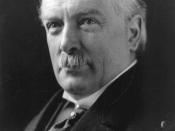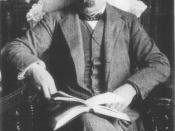What were the aims of David Lloyd George's social reforms in the Edwardian period? Word Count: 1285 Britain in the late nineteenth century was a world leading economic and military power. Although it was becoming more apparent that it was not going to remain a leading world power, if the massive social problems facing much of the country were not addressed. Problems such as poverty, unemployment, health care and education. Seebohm Rowntree had highlighted the extent and cause of these social problems through his extensive investigations and publication of, Poverty, a study of Town Life in 1901. "Throughout the eighties and nineties, at an increasing rate, the nation's awareness of what was comprehensively called 'the social problem' had grown in width and depth." It was quite clear by the time Lloyd George was promoted to Chancellor of the Exchequer in 1906 that there was a need for new priorities in the Liberals policies and he believed that they lay in social reforms.
"He was mainly seeking all party support for a programme of domestic social reform to tackle housing, health insurance, unemployment, education, the poor law, alcohol abuse and agriculture." . Lloyd George knew that in order for the Liberal party to continue in its popularity it needed the support of the working classes. It was the working classes who would benefit directly from social reforms and so bring about support for the party and for Lloyd George. The massive need for social reform was also fueled by the fact that Britain was as an industrial power falling behind other world powers such as Germany and the United States. "Some employers became aware that the efficiency of the workforce could be increased not only by capital investmentâ¦but also by improving the efficiency of human capital, i.e. by improving working conditions and providing welfare benefits for workersâ¦" . It was time for the government to step in and attempt to pull Britain out of social collapse.
The Liberal party had before not really committed themselves to any major social reforms, that was not until Lloyd George became Chancellor of the Exchequer in 1906. Then it could be said began a period of 'New Liberalism' and radical social reforms in favour of Britain's working class. He knew there needed to be a new approach to the social problems facing much of Britain's working classes. Lloyd George "Urged a massive assault on unemployment, sickness, slum housing and structural poverty." All of Lloyd George's proposed policies were met with some agitation, mostly always from the upper classes as they were normally the victims of high taxes which were needed to raise the revenue required to fund the new social policies.
The Introduction of pensions for the old had been around in Germany since the late nineteenth century, it was not introduced in Britain until 1908. Many old people welcomed state-funded pensions because they now received a regular income. Although in order for the government to fund these new pensions which over 490,000 people qualified it needed to raise 16 million pounds a year. "The introduction of pensions was an official admission that the respectable and hard-working could be poor through no fault of their own." Lloyd George found new popularity among the working classes as he was seen as trying to bring about a rise in their standard of living, this is shown through his policies such as the 1911 National Insurance Act and 1908 Old Age Pensions Act.
It was in Lloyd George's visit to Germany during 1908 that he realised just how much Britain was falling behind the rest of the world and that the need for social improvements were urgent. Lloyd George was impressed with what he saw in Bismarck's Germany in terms of their social standards and standard of living he realised that if Britain was to remain ahead it was in need of some modernising changes and fast. "During his highly Unorthodox visit to Germany in the summer of 1908â¦in which the striking achievement of Bismarckian social legislation deeply impressed him." This led to him introducing a National Insurance in 1911, although this scheme was a big leap towards a modern state did not cover everybody, many like the mentally ill were left out. The indroduction of National Insurance proved that the government (especially Lloyd George) was highly aware that poverty and sickness needed to be tackled if the working classes were going to enjoy any kind prosperity in twentieth century Britain. It was the first system in Britain that gave the working classes insurance against illness and employment. There was a long way to go but Lloyd George had laid a foundation, which could be built upon, and it was to become known as the welfare State. Some saw National Insurance as the first step towards the prevention of unemployment, it seems this is how Lloyd Gerorge felt.
It could be said that Lloyd George along with Winston Churchill highlighted the need for social reform and went some way to implimenting it. It is well known that change is not easily brought about especially when its to help the people at the lower end of the social scale. Attitudes towards poverty were changing in Britain during Lloyd Georges time in office, and people became aware that it was a national problem which needed addressing. Britain could not remain a leading world power if social conditions did not improve. Poverty and ill health was a burden upon industry and the army without a healthy workforce and army Britain was powerless. Lloyd George had a hard task ahead of him, as bringing about a welfare state was not easy, funding had to come from somewhere. His infamous 'Peoples Budget' was met with uproar and rejected from the House of Lords in 1908 due to the proposed taxing of the wealthy landed eliets Lloyd George was taxing the rich for the benefit of the poor. The budget was eventualy passed but only with help from the king.
It could be said that the aims of George Lloyd's social reforms were to keep Britain a world leading power. To put an end to Britain's social decline and raise the standard of living.
What were the aims of David Lloyd George's social reforms in the Edwardian period? Vicki Bruce Word Count: Britain in the late nineteenth century was a world leading economic and military power. Although it was becoming more apparent that it was not going to remain a leading world power, if the massive social problems facing much of the country were not addressed. Problems such as poverty, unemployment, health care and education. Seebohm Rowntree had highlighted the extent and cause of these social problems through his extensive investigations and publication of, Poverty, a study of Town Life in 1901. "Throughout the eighties and nineties, at an increasing rate, the nation's awareness of what was comprehensively called 'the social problem' had grown in width and depth." It was quite clear by the time Lloyd George was promoted to Chancellor of the Exchequer in 1906 that there was a need for new priorities in the Liberals policies and he believed that they lay in social reforms. "He was mainly seeking all party support for a programme of domestic social reform to tackle housing, health insurance, unemployment, education, the poor law, alcohol abuse and agriculture." . Lloyd George knew that in order for the Liberal party to continue in its popularity it needed the support of the working classes. It was the working classes who would benefit directly from social reforms and so bring about support for the party and for Lloyd George. The massive need for social reform was also fueled by the fact that Britain was as an industrial power falling behind other world powers such as Germany and the United States. "Some employers became aware that the efficiency of the workforce could be increased not only by capital investmentâ¦but also by improving the efficiency of human capital, i.e. by improving working conditions and providing welfare benefits for workersâ¦" . It was time for the government to step in and attempt to pull Britain out of social collapse.
The Liberal party had before not really committed themselves to any major social reforms, that was not until Lloyd George became Chancellor of the Exchequer in 1906. Then it could be said began a period of 'New Liberalism' and radical social reforms in favour of Britain's working class. He knew there needed to be a new approach to the social problems facing much of Britain's working classes. Lloyd George "Urged a massive assault on unemployment, sickness, slum housing and structural poverty." All of Lloyd George's proposed policies were met with some agitation, mostly always from the upper classes as they were normally the victims of high taxes which were needed to raise the revenue required to fund the new social policies.
The Introduction of pensions for the old had been around in Germany since the late nineteenth century, it was not introduced in Britain until 1908. Many old people welcomed state-funded pensions because they now received a regular income. Although in order for the government to fund these new pensions which over 490,000 people qualified it needed to raise 16 million pounds a year. "The introduction of pensions was an official admission that the respectable and hard-working could be poor through no fault of their own." Lloyd George found new popularity among the working classes as he was seen as trying to bring about a rise in their standard of living, this is shown through his policies such as the 1911 National Insurance Act and 1908 Old Age Pensions Act.
It was in Lloyd George's visit to Germany during 1908 that he realised just how much Britain was falling behind the rest of the world and that the need for social improvements were urgent. Lloyd George was impressed with what he saw in Bismarck's Germany in terms of their social standards and standard of living he realised that if Britain was to remain ahead it was in need of some modernising changes and fast. "During his highly Unorthodox visit to Germany in the summer of 1908â¦in which the striking achievement of Bismarckian social legislation deeply impressed him." This led to him introducing a National Insurance in 1911, although this scheme was a big leap towards a modern state did not cover everybody, many like the mentally ill were left out. The indroduction of National Insurance proved that the government (especially Lloyd George) was highly aware that poverty and sickness needed to be tackled if the working classes were going to enjoy any kind prosperity in twentieth century Britain. It was the first system in Britain that gave the working classes insurance against illness and employment. There was a long way to go but Lloyd George had laid a foundation, which could be built upon, and it was to become known as the welfare State. Some saw National Insurance as the first step towards the prevention of unemployment, it seems this is how Lloyd Gerorge felt.
It could be said that Lloyd George along with Winston Churchill highlighted the need for social reform and went some way to implimenting it. It is well known that change is not easily brought about especially when its to help the people at the lower end of the social scale. Attitudes towards poverty were changing in Britain during Lloyd Georges time in office, and people became aware that it was a national problem which needed addressing. Britain could not remain a leading world power if social conditions did not improve. Poverty and ill health was a burden upon industry and the army without a healthy workforce and army Britain was powerless. Lloyd George had a hard task ahead of him, as bringing about a welfare state was not easy, funding had to come from somewhere. His infamous 'Peoples Budget' was met with uproar and rejected from the House of Lords in 1908 due to the proposed taxing of the wealthy landed eliets Lloyd George was taxing the rich for the benefit of the poor. The budget was eventualy passed but only with help from the king.
It could be said that the aims of George Lloyd's social reforms were to keep Britain a world leading power. To put an end to Britain's social decline and raise the standard of living.





